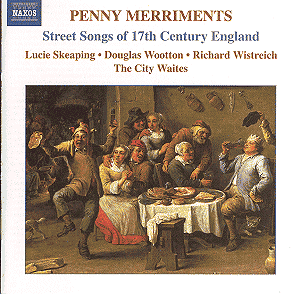Broadside ballads have
seldom sounded as entertaining as here.
These folk ballads, the street songs
of the seventeenth century as the discís
subtitle has it, ranged over the political,
scurrilous, sexual, historical, religious
and saucy in equal measure. Though printing
gave them currency and a degree, at
least, of permanency, most would have
been heard, sung rather than read and
the element of topicality was, then
as now, of primary concern. Yesterdayís
broadside ballad was as old hat as yesterdayís
newspaper.
The City Waites, with
singers Lucie Skeaping, Douglas Wootton
and Richard Wistreich to the fore, are
accompanied by an apposite assemblage
of instruments; cittern, theorbo, baroque
guitar and bass curdal (Iím not sure
either) as well as recorder, fiddle,
bum fiddle (Iíd rather not ask) and
bagpipes. Each ballad is surely and
wittily, sometimes warmly or wanly,
characterised and the variety is as
wide as the ballads themselves. Thus
we take in Royalist sentiment and alcohol
in The Courtiers Health, or
The Merry Boys of the Times with
its anti-Papist rough edge. We also
encounter Wistreichís splendid comic
turn, a sort of Max Miller-meets-Chaucer,
in The Crost People, or A Good Misfortune
a generic though hilarious Peeping Tom
ballad. The foolish and the rustic are
very much part of the tradition and
youíll hear an example of the latter
in The Countryman's Joy. It doesnít
take much of a leap of imagination to
trace the lineage of the broadside ballad
back to the border ballad and far forward
to the late nineteenth century coster
songs of the Music Hall Ė thatís certainly
implicit in A Merry Jest of John
Thomson and Jakaman His Wife.
There are ballads of
men complaining of women and of women
complaining about men; thereís a female
toperís ballad in The Seven Merry
Wives of London, or The Gossips
Complaint and a Good Old Days ballad
in Old England Grown New, sung
to Greensleeves, which could have been
written today Ė "new houses are
built and the old ones pulled down"
as well as complaints about fancy new
French fashions, beards, diseases and
the like. Instructions as to how to
win a maid (thatís putting it mildly)
are given in Good Advice to Batchelors,
How to Court and Obtain a Young
Lass whilst Wistreichís oak-y
voice enlivens The Lunatick Lover
and its hints of the Elizabethan lute
song tradition. The Saint Turn'd
Sinner is a sprightly patter ballad
sung by Douglas Wootton to a captivating
Eccles tune and replete with some outrageous
rhymes whilst The Female Captain,
or The Counterfit Bridegroom is
one of those cross-dressing ballads
that explore things I canít repeat here
Ė mainly to do with two young women
and an inflated sheepís bladder - oddly
enough there was a female jazz pianist
in the 1930s who did much the same thing.
On a less provocative note Lucie Skeaping
relishes the adulterous band-swapping
antics of The Downfall of Dancing,
an activity thatís never likely to go
out of fashion for as long as men and
women wield fiddle, bow and baton.
This is a delicious
piece of entertainment. Bawdy or brave,
nautical or noxious these ballads explore
the stuff of life in all its messiness
and truthfulness. This would count for
little were the performances merely
dutiful but, even in the confines of
a studio, this bandís zest is palpable,
their accents and colours infectious,
the instrumentation and vocal antics
fusing with élan. Job done, the
reviewer usually boxes away his disc
never to be heard of again. Not this
one.
Jonathan Woolf














